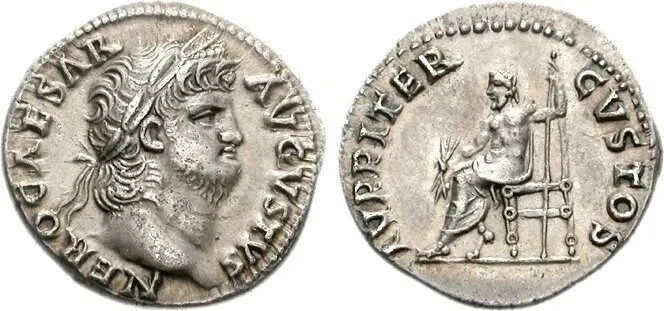Give to Caesar what is Caesar’s; and to God what is God’s — Jesus (Mark 12.17)
What belongs to God never really has been the question. God’s Spirit is our life breath, animating our bodies with every inhale and exhale. We bear the image of God (like the denarius bore Caesar’s image in the text just mentioned), and therefore all that is our life is due God. We are called to love God with all we are. Everything belongs to God. This confession is at the utter core of the Christian faith.

Preston Clegg
What belongs to Caesar is tricky to consider, largely because Caesar keeps changing clothes. What belonged to Caesar when Nero was the actual Caesar of Rome, burning a huge part of the city of Rome and blaming the Christians for it? What belonged to Caesar when he wore a swastika in 1930’s Germany and ecclesial devotion to country empowered the agenda of the Third Reich? What belongs to Caesar in tyrannical theocratic governments, where God and country seem to be one word? What belongs to Caesar in a participatory and constitutionally democratic republic like ours, where we shape the government that then shapes us?
Wrestling with this teaching of Jesus is good and right, and I would argue it is necessary for followers of Jesus. And Christians of “good faith” have lived into the wisdom of this verse in different ways across the centuries.
The most obvious danger within this teaching is conflating God and Caesar to the point that the tension is lost because no one can tell the difference between the two. Confusing Caesar and God is idolatrous on the one hand and foolishly unloving on the other. And there is no more prescient example of this confusion in our day than Christian nationalism.
“Confusing Caesar and God is idolatrous on the one hand and foolishly unloving on the other.”
Christian nationalism is an insidious danger to both Christianity and our nation, and it is increasing in power and influence in this country. While it was anathema to claim the ideology just a few decades ago, today it is moving headlong toward the center of American life, with numerous politicians — at various levels of government — wearing it like a badge of honor.
At its heart, Christian nationalism is the dangerous conflation of the Christian faith and nationalistic fervor. Christian nationalism believes this country is best run by, with and for Christians, with Christian interests of primary importance. Rather than true religious liberty, Christian nationalism seeks Christian primacy over other faiths or no faith at all in the public arena.
In the same vein, it prioritizes American well-being over and above the well-being of people in other countries, many of them Christians. Christian nationalism is fueled by the wrongheaded and wrong-hearted belief that Christians make the best Americans and Americans make the best Christians.
Because the umbilical cord of the Christian faith runs from the Judaism that birthed us, we have received numerous gifts from Judaism. In the Hebrew Bible, nearly all of Israel’s neighbors were polytheistic, believing in many gods, with each having their own geographical domain and tribal jurisdiction. Each god had a realm for which they were responsible. But the people of Israel learned, largely in exile in Babylon, that Yahweh was God of all people in all places and at all times.
God chose Abraham to be a blessing to all the nations. This was no nationalistic god or tribal deity. This was a cosmic God, and this tradition is the one that nurtured Jesus of Nazareth, who came because God so loved the whole world.
“Christian nationalism seems to have more in common with the religions of the neighbors of the Hebrew people than the religion of the Hebrew people themselves.”
Christian nationalism seems to have more in common with the religions of the neighbors of the Hebrew people than the religion of the Hebrew people themselves. The god of Christian nationalists tends to be tribal and nationalistic, rather than the God of all people and all places. The god of Christian nationalism proclaims good news for some people. The God of the Christian faith proclaims good news for all the people. The god of Christian nationalism orients love around borders. The God of the Christian faith orients borders around love.
As an ideology, Christian nationalism prevents us from loving our neighbors of other faiths as ourselves. The moment one begins saying, “American is a Christian nation” is the same moment one begins to relegate the adherents of other faiths — or no faith at all — to second-class status in this country.
If Christian symbols are considered preeminent in the public domain, then what is the place of the symbols of other faiths? How would American Christians prefer fellow Christians in other cultures, who are the religious minority, be treated? If we want Christians in Muslim, Jewish, Buddhist and secular societies to be treated equally, we should and must do the same with other faiths in our country.
This is Love-Your-Neighbor-As-Yourself-101. In this way, and several others, America is not a Christian nation. We are a nation that believes in religious liberty for all people, including Christians.
Because Christian nationalists tend to think Christians make the best Americans, they tend to oppose immigration, especially from non-Christian majority countries, and frown upon refugee resettlement. This point also is where Christian nationalism feeds on racist sentiments and is better referred to as white Christian nationalism. Because they exalt American interests as foremost in the mind of God, they are critical of global or international organizations such as the United Nations.
These views undercut the American ideals of religious liberty and separation of church and state while also suppressing the voice and presence of religious minorities in our country.
“Christian nationalism seeks to do with power what it is unwilling to do with love.”
Ultimately, Christian nationalism seeks to do with power what it is unwilling to do with love. It seeks to inscribe Christian ideals into the levers of American political power rather than influencing others to ascribe to the Christian way through our love, service and integrity. It is fueled by power over people rather than presence with people.
Christian nationalism says “yes” to every temptation Jesus said “no” to in the wilderness. In the end, Christian nationalism is simply plain old nationalism with a thin Christian veneer to justify it, and it seeks purportedly Christian ends through demonstrably unchristian means and with antithetically Christian attitudes.
Christian nationalism confuses Caesar with God, which then deifies the nation, belittles those who differ and dilutes the power of the Christian faith. It gives to God what belongs to Caesar and to Caesar what belongs to God, throwing everything into disarray.
When Caesar and God are confused, everything placed on the altar is corrupted. There is a better way, in which the name of Jesus is linked to the ways, attitudes and habits of Jesus. May we be the ones who walk it.
Preston Clegg serves as pastor of Second Baptist Church in Little Rock, Ark. He has served churches in Arkansas, Texas and Oklahoma. He earned a bachelor’s degree in Christian ministry from Williams Baptist College in Walnut Ridge, Ark., then both master of divinity and doctor of ministry degrees from George W. Truett Theological Seminary at Baylor University.
Related articles:
The threat of Christian nationalism in all 50 states, illustrated in eight charts | Analysis by Robert P. Jones
How to tell if it’s ‘Christian nationalism’ or not
Christian nationalism: How evangelical Christianity became a political religion | Analysis by Alexander Lang

